How does beer affect sleep?
If you read our article “How does alcohol affect sleep”, you'll know that heavy drinking comes with some serious consequences. Not only does it disrupt your sleep cycle but it can also lead to other health complications later on.
However, since beer has a relatively low alcohol percentage, you'd be led to believe that it's more-or-less safe, right? Well, there are a lot of factors at play.
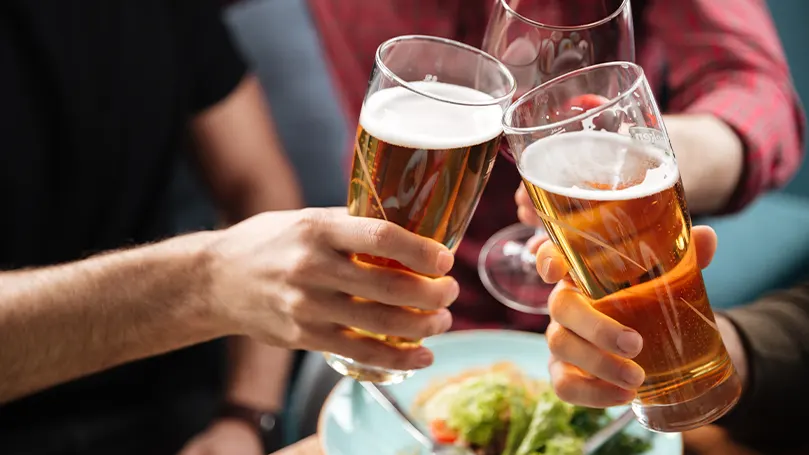
On the one hand, it can affect sleep in the same negative manner other stronger alcohol affects sleep. Especially if you go overboard. On the other hand, when taken in small quantities, drinking beer also seems to come with certain health benefits!
So, let's start things off with the worst-case scenario, then we can move on to the benefits and a few potentially useful tips you can use in order to better your sleep quality.
The downsides of drinking beer
The problem with drinking alcohol is that it's very easy to get carried away. And this can be especially common with beer as it doesn't knock you off your feet quite as quickly as stronger alcoholic beverages.
And if you happen to drink more beer than you're body can easily handle and then try to fall asleep – you're in for a rough night. This is due to a few major ways in which beer can affect our sleep.
Disrupted sleep cycle
Although having a few beers can make you feel drowsy and help you fall asleep faster initially, the relationship between alcohol and sleep is rarely all positive. Drinking beer initially allows you to fall asleep quickly because it's a central nervous system depressant, or in layman's terms, it has sedative effects. Binge drinking can also send you straight into a deep sleep, foregoing the first two sleep cycles to an extent.
However, once you've fallen asleep, you're likely to wake up multiple times during the night. The night disturbance can be something as simple as going to the bathroom (since beer is a diuretic) or as nerve-wracking as having to throw up.
Not to mention that even the initial sedative properties of beer won't help you fall asleep if the room is spinning and you feel sick. And if you drink alcohol regularly, we're sure this is something you've already experienced.
Less REM sleep
If waking up wasn't bad enough, the sleep you do get is also of lesser quality than usual. And this is because you generally get less REM sleep after alcohol consumption when compared to a normal night of sleep.
Getting enough REM sleep is essential – as it's during this time that your mind actually rests. So, even if you don't have nighttime disturbances, and your energy levels are fine, you're likely to experience brain fog and be less motivated than usual.
Developing sleep disorders
Research has shown that consistent drinking is linked to insomnia symptoms and other sleep disorders. People can get into the habit of drinking beer before bed in order to be sedated and fall asleep quickly, however, your body will build up a tolerance.
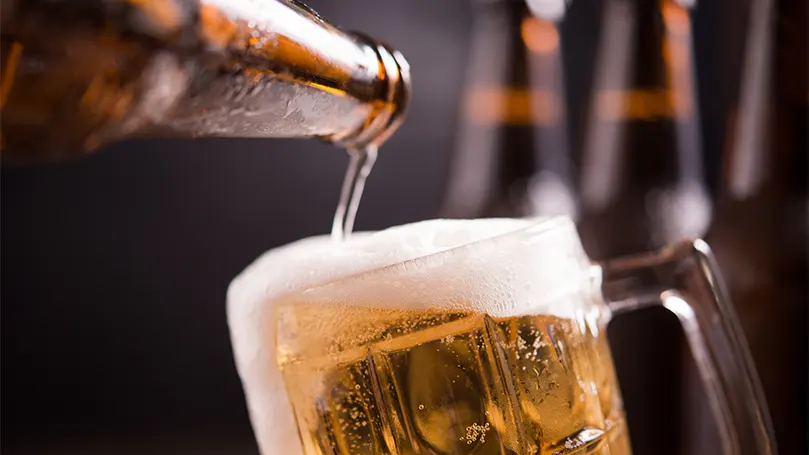
And if you try to overcome this tolerance with even more beer – bad things tend to happen. As we've mentioned previously, alcohol use has been shown to both lower your REM sleep time and cause nighttime disturbances, leading to an unhealthy sleep-wake cycle in the long run.
Not to mention that beer can also make already existing issues even more problematic – for example, obstructive sleep apnea. This in turn can cause sleep disruption as well, leading to even worse overall sleep quality and duration.
Developing other health problems
Although we mostly want to focus on how beer can affect sleep, it's worth pointing out how it affects the rest of your body as well. For one, people who suffer from acid reflux (or GERD) are likely to have a turbulent night because of the acidity of beer.
Aside from that, you should also expect night sweats (and thus potential dehydration), high blood pressure, and problems with digestion. And if we really want to talk about the worst-case scenario, beyond how it affects sleep, alcohol can cause heart disease, certain kinds of cancers, mental health issues, weakening of the immune system, and so on.
A terrible start to the morning
From what we've stated so far, it's clear that if you want good sleep, alcohol isn't your best friend. At least not when taken in huge quantities. After all, alcohol disrupts sleep homeostasis and can throw your entire system out of sync.
And this means that the following morning can be quite rough. From the hangover to the mental exhaustion and accumulated sleep debt, you're likely to start the day off on the wrong foot.
Are there benefits to drinking beer?
Now that we've gone over all the worst-case scenarios and the ways in which beer can harm your sleep quality, let's talk about a few positives. Although we will heavily stress that these pros are only applicable when you drink a small amount of beer.
Beer can help you fall asleep (sometimes)
Although we're firmly against using beer as a sleep medicine, it can help in some specific circumstances. Although overindulging in beer can cause insomnia, it can also help temporarily ward it off.
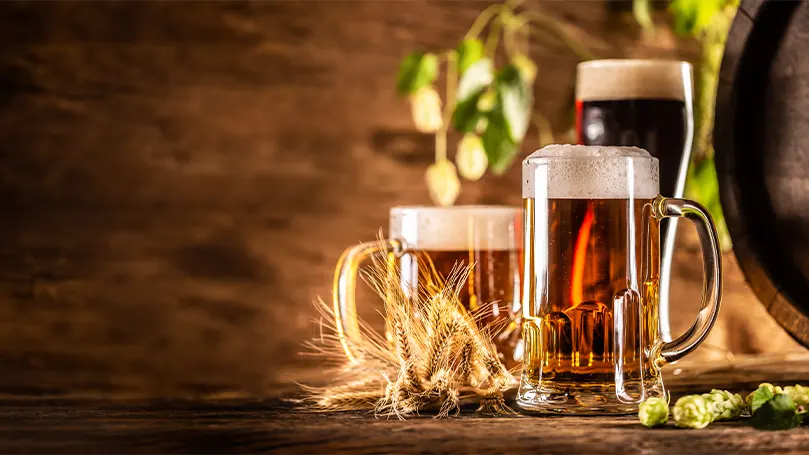
That is to say that if you don't drink too often, the sedating effect can kick in after a single beer, and you can hypothetically get better sleep. And since insomnia is the most common sleep disorder, something like this can help out quite a few people. However, the part we'd like to focus on more is how beer relates to reducing stress and anxiety.
Research has shown that having a bit of beer drunk during the day every so often can help lower your stress and anxiety levels. And since both stress and anxiety directly hamper your sleep, this is a really good way to catch some extra ZZZs.
Beer can improve your overall health
When taken in moderation, beer has actually been shown to help out in a few very important areas! These include:
- Making you less likely to contract heart disease or suffer from a heart attack/stroke
- You're less likely to develop kidney stones
- Lowering your LDL or bad cholesterol
- Reduces the chances of osteoporosis
- Can help with certain cognitive functions
However, this isn't a sign that you should start drinking beer every single day. After all, these studies mostly monitored small, healthy amounts of beer consumption and their effects on the body. So, if you had to choose, drinking no beer is probably still the best course of action but a drink or two here and there shouldn't hurt either.
How much beer is safe to drink?
Throughout this article, we've mentioned the term “a healthy amount of beer”. And you might have been wondering, how much beer is healthy? Well, the wait is over and it's high time we discussed this very issue.
Generally speaking, men are recommended to avoid drinking more than two glasses of beer and women shouldn't go over one glass. However, this is a gross oversimplification and should serve more as a general principle rather than a precise guideline.
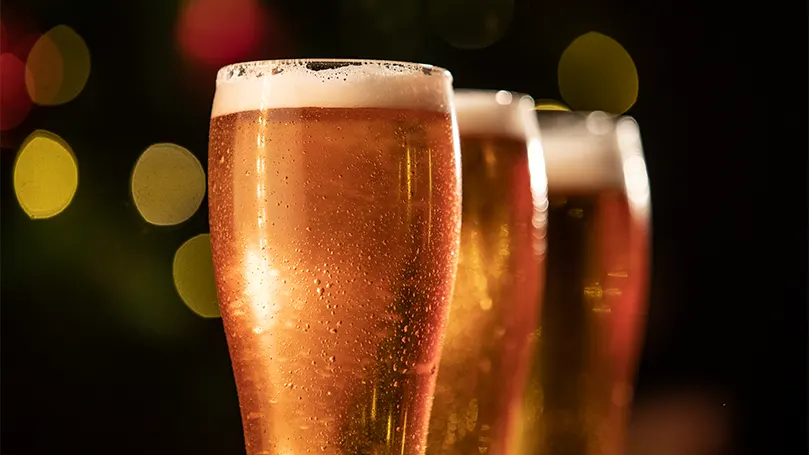
After all, you have to take into account factors like your build, the size of the glass, the type of beer, your metabolism, and so on. But if you want a precise picture, we recommend giving this article a read and seeing where exactly you fit into the picture.
And do note, just like it states in the article, that even if you don't go over the maximum amount, you should avoid drinking every single day.
How to stop drinking beer
If keeping track of all the little details doesn't seem worth a beer or you want to better your overall health in the long run, abstaining from alcohol might be the perfect solution for you.
However, if you've ever tried to celebrate Dry January, you'll know that it can be somewhat difficult to quit. But that doesn't mean that it's impossible! So, here are some general tips for staying sober.
- Stop romanticising alcohol – you can be as fun, laid-back, and adventurous while sober as while drunk. Recognizing that you inherently have these qualities might make alcohol less enticing.
- Enlist the help of your loved ones – your loved ones should always want what's best for you. And since they're the people you spend the most time around, they can keep you in check as well.
- Seek outside help – if sharing your issues with your family isn't something you're comfortable with, reach out to professionals! We highly recommend taking a look at this list from NHS about all the available support you can get in the UK.
- Swap to non-alcoholic drinks – even if beer is your favourite drink, that doesn't mean it has to always be alcoholic. Gather some friends and try to find the best non-alcoholic beer that will still scratch that itch for you.

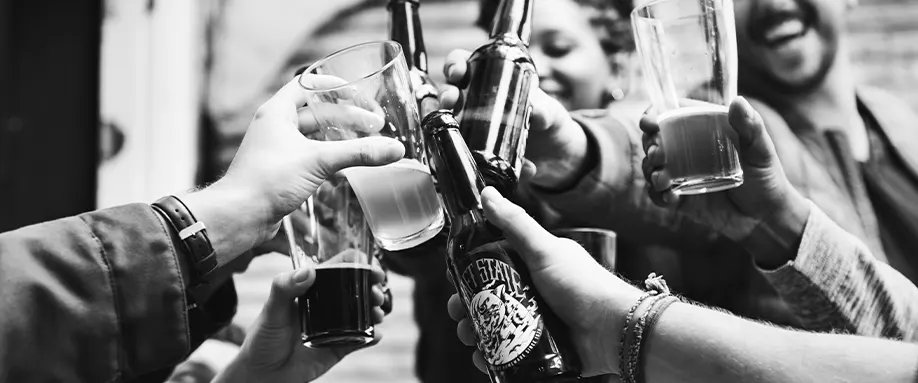











There are no comments yet
"*" indicates required fields